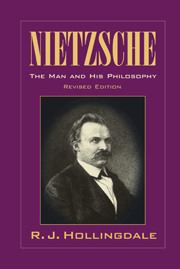Summary
The most important events in the domain of the study of Nietzsche since this book first appeared, in 1965, have been the publication of the Colli-Montinari editions of Nietzsche's works and letters and the enormous enlargement of interest in him both within and beyond the academic world.
In 1965 the most recent edition of the works advertised as being complete was the Musarionausgabe, which appeared in 23 volumes from 1920 through 1929; but the text of that edition, though it was arranged differently, differed hardly at all in substance from that of the self-styled ‘standard’ edition, the Gesamtausgabe in Grossoktav, the second version of which was published in 19 volumes from 1901 through 1913. It was a product of the Nietzsche Archive in Weimar, the keys of which were still in the custody of Elizabeth, where they remained until her death in November 1935 at the age of 89. A new, 'historical-critical’ edition was begun in 1933 but was halted by the war when it had advanced no further than the juvenilia; and partial publication of his writings between the appearance of the Musarionausgabe and the beginning of the Colli-Montinari edition failed, with one exception, to augment further the quantity accessible to the reader. This exception, Erich Podach's Friedrich Nietzsches Werke des Zusammenbruchs which appeared in 1961, was based on original research in Weimar—seemingly the only foray into the German Democratic Republic to eventuate in the publication of new material. The upshot of all these considerations was that in the 1960s Nietzsche's text, especially the text of the writings and notes unpublished at the time of his collapse—the so-called Nachlass—was still almost in the state in which it was presented in Elizabeth's edition of the first decades of the century.
The Colli-Montinari edition is an improvement on this in every respect: in conjunction with a publication I shall mention in a moment it enables us for the first time to speak of a definitive edition of Nietzsche's work. What has excited most interest in this edition has been its publication of the Nachlass in something approaching the order in which it was written so far as this can be ascertained, and while this is obviously of consequence for the student of his philosophy it is also of a distinct and peculiar interest to his biographer.
- Type
- Chapter
- Information
- NietzscheThe Man and His Philosophy Revised Edition, pp. 255 - 262Publisher: Cambridge University PressPrint publication year: 1999



